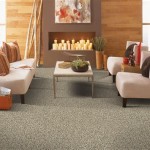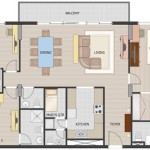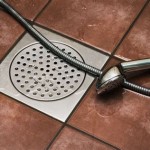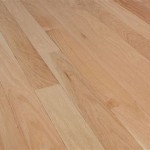Hickory Hardwood Flooring: An Examination of its Merits and Drawbacks
Hickory hardwood flooring is a popular choice for homeowners seeking a durable and aesthetically pleasing flooring option. Known for its exceptional hardness and distinctive grain patterns, hickory brings a rustic and natural appeal to any interior space. However, like any flooring material, it also presents certain drawbacks that prospective buyers should carefully consider before making a decision. This article provides a comprehensive overview of the pros and cons associated with hickory hardwood flooring, enabling informed decision-making.
Hickory is derived from the hickory tree, a species native to North America. It is consistently ranked among the hardest and most durable domestic wood species used in flooring. This innate strength translates into a surface highly resistant to wear and tear, making it suitable for high-traffic areas and households with pets or children. Beyond its robustness, hickory's visual characteristics contribute significantly to its appeal. The wood exhibits a wide range of color variations, from creamy whites to reddish browns, combined with pronounced grain patterns that add character and depth to the floor.
Durability and Longevity
One of the most significant advantages of hickory hardwood flooring is its exceptional durability. Measured on the Janka hardness scale, which quantifies the resistance of wood to indentation, hickory consistently scores high, typically ranging from 1820 to over 2000. This score surpasses that of many other popular hardwood flooring options, such as oak, maple, and cherry. The higher the Janka rating, the more resistant the wood is to scratches, dents, and general wear and tear. This inherent hardness translates into a flooring surface that can withstand the rigors of daily life, maintaining its appearance for an extended period.
This durability makes hickory a particularly suitable choice for areas of a home that experience heavy foot traffic, such as hallways, living rooms, and kitchens. Furthermore, it is well-suited for households with pets, as its resistance to scratching helps to minimize damage caused by claws. The inherent strength of hickory reduces the likelihood of dents and impressions caused by furniture or dropped objects, preserving the floor's pristine appearance over time. Properly installed and maintained hickory flooring can last for generations, representing a long-term investment in the value and aesthetics of a home.
The longevity of hickory flooring is further enhanced by its ability to be refinished. Over time, even the most durable flooring can show signs of wear and tear. However, unlike some flooring options that require replacement when surface damage occurs, hickory can be sanded and refinished multiple times, essentially restoring it to its original condition. This refinishing capability extends the lifespan of the flooring significantly, making it a cost-effective choice in the long run. The ability to change the stain color during refinishing also allows homeowners to update the look of their floors to match changing décor preferences.
Aesthetic Appeal and Versatility
Beyond its practical advantages, hickory hardwood flooring is also prized for its unique aesthetic appeal. The wood's natural color variation, ranging from light sapwood to darker heartwood, creates a visually dynamic surface that adds character and warmth to any room. These variations, coupled with the pronounced grain patterns, contribute to a rustic and natural look that is both timeless and inviting.
The versatility of hickory allows it to complement a wide range of interior design styles. It pairs well with both traditional and contemporary décor, adding a touch of natural elegance to any space. In rustic or farmhouse-style homes, hickory flooring enhances the overall ambiance, creating a sense of warmth and authenticity. In more modern settings, the natural variations in color and grain can provide a contrasting element that adds visual interest and depth.
Hickory is available in various plank widths and finishes, further enhancing its versatility. Wider planks often showcase the wood's natural grain patterns more prominently, creating a more dramatic effect. Different finishes, such as matte, satin, or gloss, can alter the overall appearance of the floor, allowing homeowners to customize the look to their specific preferences. The range of options available ensures that hickory can be tailored to suit a wide variety of design aesthetics.
The unique characteristics of hickory wood ensure that no two floors are exactly alike. This natural variation adds to the flooring's charm and contributes to a one-of-a-kind look that is highly desirable to many homeowners. The inherent beauty of hickory hardwood flooring can significantly enhance the overall value and appeal of a home.
Hardness and Installation Challenges
While the hardness of hickory is a significant advantage in terms of durability, it also presents challenges during installation. Its density makes it more difficult to cut and nail than softer wood species. This can increase the time and labor required for installation, potentially leading to higher installation costs.
Due to its hardness, specialized tools and techniques are often required to ensure a proper installation. Nailing or stapling can be more difficult, requiring more force and potentially leading to damage if not done correctly. Pre-drilling pilot holes may be necessary to prevent splitting and ensure secure fastening. The use of high-quality saw blades and drill bits is essential to avoid dulling and ensure clean cuts.
Given these challenges, it is highly recommended that hickory hardwood flooring be installed by experienced professionals. Proper installation is crucial to ensure the longevity and performance of the floor. Experienced installers will have the necessary tools, skills, and knowledge to handle the unique challenges posed by hickory's hardness, ensuring a flawless and long-lasting result. Attempting a DIY installation without the proper expertise can lead to costly mistakes and potentially compromise the structural integrity of the floor.
The increased time and labor associated with installing hickory should be factored into the overall cost of the flooring project. While the material cost of hickory may be comparable to other hardwood options, the installation costs may be higher due to the added complexity. It is important to obtain accurate quotes from multiple installers and factor in the potential for additional labor costs when budgeting for the project.
Cost Considerations
Hickory hardwood flooring typically falls within the mid-range to high-end price point compared to other hardwood options. The cost can vary depending on factors such as grade, plank width, finish, and sourcing. Engineered hickory flooring, which consists of a thin layer of hickory veneer over a plywood core, is generally more affordable than solid hickory flooring.
While the initial cost of hickory flooring may be higher than some alternatives, its durability and longevity can make it a cost-effective choice in the long run. The ability to refinish the floor multiple times extends its lifespan, reducing the need for replacement. The reduced risk of damage from scratches, dents, and wear and tear also contributes to long-term cost savings.
It is important to consider the overall lifecycle cost of hickory flooring when making a decision. While the upfront cost may be higher, the reduced maintenance requirements and extended lifespan can offset these costs over time. Comparing the total cost of ownership, including installation, maintenance, and potential replacement costs, can provide a more accurate picture of the true value of hickory flooring.
When budgeting for a hickory flooring project, it is essential to obtain quotes from multiple suppliers and installers. Prices can vary significantly depending on the source and the specific characteristics of the flooring. Factor in the cost of underlayment, trim, and other necessary materials, as well as the cost of installation labor.
Susceptibility to Moisture
Like all hardwood flooring, hickory is susceptible to moisture damage. Excessive moisture can cause the wood to swell, warp, or cup, leading to unsightly damage and potentially compromising the structural integrity of the floor. It is crucial to maintain proper humidity levels in the home and take precautions to prevent water damage.
Areas that are prone to moisture, such as bathrooms, kitchens, and basements, require extra attention when installing hickory flooring. It is recommended to use a moisture barrier underlayment to protect the wood from rising dampness. Additionally, it is important to promptly clean up spills and leaks to prevent water from penetrating the wood.
Maintaining a consistent humidity level in the home is essential to prevent moisture-related problems. Using a humidifier or dehumidifier can help to regulate humidity levels and prevent excessive swelling or shrinking of the wood. The ideal humidity level for hardwood flooring is typically between 30% and 50%.
Engineered hickory flooring is generally more resistant to moisture than solid hickory flooring. The plywood core of engineered flooring is less susceptible to expansion and contraction, making it a more suitable option for areas with higher humidity levels. However, even engineered hickory flooring requires proper installation and maintenance to prevent moisture damage.
In areas with high humidity or frequent exposure to water, alternative flooring options, such as tile or vinyl, may be more appropriate. These materials are waterproof and will not be damaged by moisture. Carefully consider the environmental conditions of the room and choose a flooring material that is well-suited to the specific needs of the space.

Pros And Cons Of American Hickory Flooring Floorset

Pros And Cons Of American Hickory Flooring Floorset

Hickory Flooring Pros And Cons The Guide Flooringstores

Hickory Flooring Pros And Cons With Key Insights Reallycheapfloors America S Cheapest Hardwood

Hickory Flooring Pros And Cons The Basic Woodworking

The Pros And Cons Of Hickory Flooring 2024 Today S Homeowner

Hickory Flooring Pros And Cons The Guide Flooringstores

Pros And Cons Of American Hickory Flooring Floorset

Hickory Flooring Pros And Cons With Key Insights Reallycheapfloors America S Cheapest Hardwood

Hickory Hardwood Flooring Pros Cons Guide








